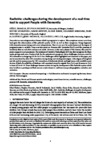RadioMe: Challenges During the Development of a Real Time Tool to Support People With Dementia
| dc.contributor.author | Shakeri, G | |
| dc.contributor.author | Brewster, S | |
| dc.contributor.author | Venkatesh, S | |
| dc.contributor.author | Moffat, David | |
| dc.contributor.author | Kirke, A | |
| dc.contributor.author | Miranda, Eduardo | |
| dc.contributor.author | Banerjee, S | |
| dc.contributor.author | Street, A | |
| dc.contributor.author | Fachner, J | |
| dc.contributor.author | Odell-Miller, H | |
| dc.date.accessioned | 2021-08-14T09:47:16Z | |
| dc.date.issued | 2021-05 | |
| dc.identifier.issn | 0360-0300 | |
| dc.identifier.issn | 1557-7341 | |
| dc.identifier.uri | http://hdl.handle.net/10026.1/17584 | |
| dc.description.abstract |
<jats:p>Recently, Generative Adversarial Networks (GANs) have received enormous progress, which makes them able to learn complex data distributions in particular faces. More and more efficient GAN architectures have been designed and proposed to learn the different variations of faces, such as cross pose, age, expression and style. These GAN based approaches need to be reviewed, discussed, and categorized in terms of architectures, applications, and metrics. Several reviews that focus on the use and advances of GAN in general have been proposed. However, the GAN models applied to the face, that we call facial GANs, have never been addressed. In this article, we review facial GANs and their different applications. We mainly focus on architectures, problems and performance evaluation with respect to each application and used datasets. More precisely, we reviewed the progress of architectures and we discussed the contributions and limits of each. Then, we exposed the encountered problems of facial GANs and proposed solutions to handle them. Additionally, as GANs evaluation has become a notable current defiance, we investigate the state of the art quantitative and qualitative evaluation metrics and their applications. We concluded the article with a discussion on the face generation challenges and proposed open research issues.</jats:p> | |
| dc.format.extent | 883-894 | |
| dc.language.iso | en | |
| dc.publisher | ACM | |
| dc.rights | Attribution-NonCommercial-NoDerivatives 4.0 International | |
| dc.rights | Attribution-NonCommercial-NoDerivatives 4.0 International | |
| dc.rights | Attribution-NonCommercial-NoDerivatives 4.0 International | |
| dc.rights | Attribution-NonCommercial-NoDerivatives 4.0 International | |
| dc.rights | Attribution-NonCommercial-NoDerivatives 4.0 International | |
| dc.rights | Attribution-NonCommercial-NoDerivatives 4.0 International | |
| dc.rights | Attribution-NonCommercial-NoDerivatives 4.0 International | |
| dc.rights | Attribution-NonCommercial-NoDerivatives 4.0 International | |
| dc.rights | Attribution-NonCommercial-NoDerivatives 4.0 International | |
| dc.rights | Attribution-NonCommercial-NoDerivatives 4.0 International | |
| dc.rights | Attribution-NonCommercial-NoDerivatives 4.0 International | |
| dc.rights.uri | http://creativecommons.org/licenses/by-nc-nd/4.0/ | |
| dc.rights.uri | http://creativecommons.org/licenses/by-nc-nd/4.0/ | |
| dc.rights.uri | http://creativecommons.org/licenses/by-nc-nd/4.0/ | |
| dc.rights.uri | http://creativecommons.org/licenses/by-nc-nd/4.0/ | |
| dc.rights.uri | http://creativecommons.org/licenses/by-nc-nd/4.0/ | |
| dc.rights.uri | http://creativecommons.org/licenses/by-nc-nd/4.0/ | |
| dc.rights.uri | http://creativecommons.org/licenses/by-nc-nd/4.0/ | |
| dc.rights.uri | http://creativecommons.org/licenses/by-nc-nd/4.0/ | |
| dc.rights.uri | http://creativecommons.org/licenses/by-nc-nd/4.0/ | |
| dc.rights.uri | http://creativecommons.org/licenses/by-nc-nd/4.0/ | |
| dc.rights.uri | http://creativecommons.org/licenses/by-nc-nd/4.0/ | |
| dc.title | RadioMe: Challenges During the Development of a Real Time Tool to Support People With Dementia | |
| dc.type | conference | |
| plymouth.date-start | 2021-05-08 | |
| plymouth.date-finish | 2021-05-13 | |
| plymouth.volume | 00 | |
| plymouth.conference-name | CHI ’21 | |
| plymouth.publication-status | Published online | |
| plymouth.journal | ACM Computing Surveys | |
| dc.identifier.doi | 10.1145/1122445.1122456 | |
| plymouth.organisational-group | /Plymouth | |
| plymouth.organisational-group | /Plymouth/Faculty of Arts, Humanities and Business | |
| plymouth.organisational-group | /Plymouth/Faculty of Arts, Humanities and Business/School of Society and Culture | |
| plymouth.organisational-group | /Plymouth/REF 2021 Researchers by UoA | |
| plymouth.organisational-group | /Plymouth/REF 2021 Researchers by UoA/UoA33 Music, Drama, Dance, Performing Arts, Film and Screen Studies | |
| plymouth.organisational-group | /Plymouth/Users by role | |
| plymouth.organisational-group | /Plymouth/Users by role/Academics | |
| dcterms.dateAccepted | 2021-03-11 | |
| dc.rights.embargodate | 2022-1-12 | |
| dc.identifier.eissn | 1557-7341 | |
| dc.rights.embargoperiod | Not known | |
| rioxxterms.funder | Engineering and Physical Sciences Research Council | |
| rioxxterms.identifier.project | Radio Me: Real-time Radio Remixing for people with mild to moderate dementia who live alone, incorporating Agitation Reduction, and Reminders | |
| rioxxterms.versionofrecord | 10.1145/1122445.1122456 | |
| rioxxterms.licenseref.uri | http://creativecommons.org/licenses/by-nc-nd/4.0/ | |
| rioxxterms.licenseref.startdate | 2021-05 | |
| rioxxterms.type | Conference Paper/Proceeding/Abstract | |
| plymouth.funder | Radio Me: Real-time Radio Remixing for people with mild to moderate dementia who live alone, incorporating Agitation Reduction, and Reminders::Engineering and Physical Sciences Research Council |



